Confused about compostable certifications? You're not alone. With so many labels like BPI, TUV, and ASTM D6400, it's easy to feel overwhelmed. But don't worry—this guide will clear things up.
Compostable certifications verify that a product breaks down safely in specific composting conditions. They differ by region (BPI for North America, TUV for Europe) and composting type (industrial vs. home). Choosing the right one ensures compliance and builds consumer trust.
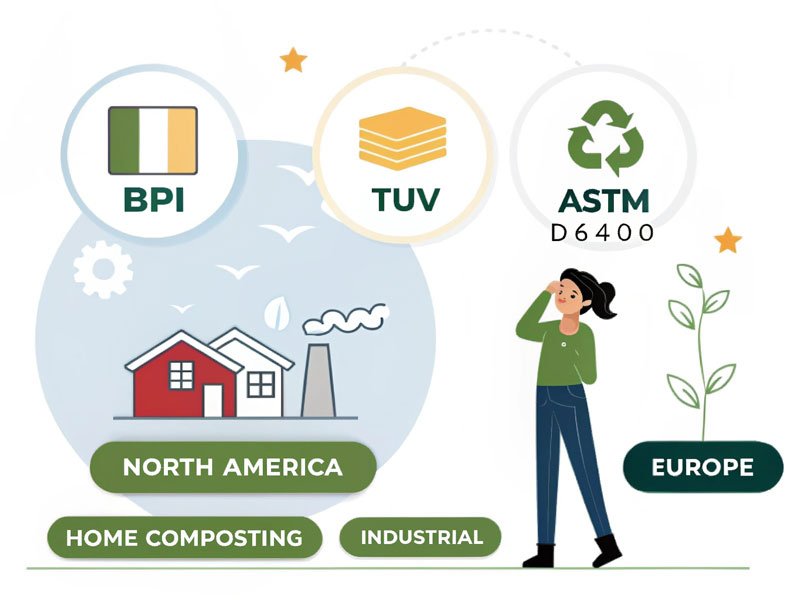
The world of compostable certifications is complex, but understanding it is crucial for brands and buyers. Let’s break it down step by step.
What is "compostable"? The difference from "biodegradable"
"Compostable" means a material breaks down into nutrient-rich compost under specific conditions (time, temperature, microbes). "Biodegradable" simply means it degrades over time—possibly leaving microplastics or toxins behind.
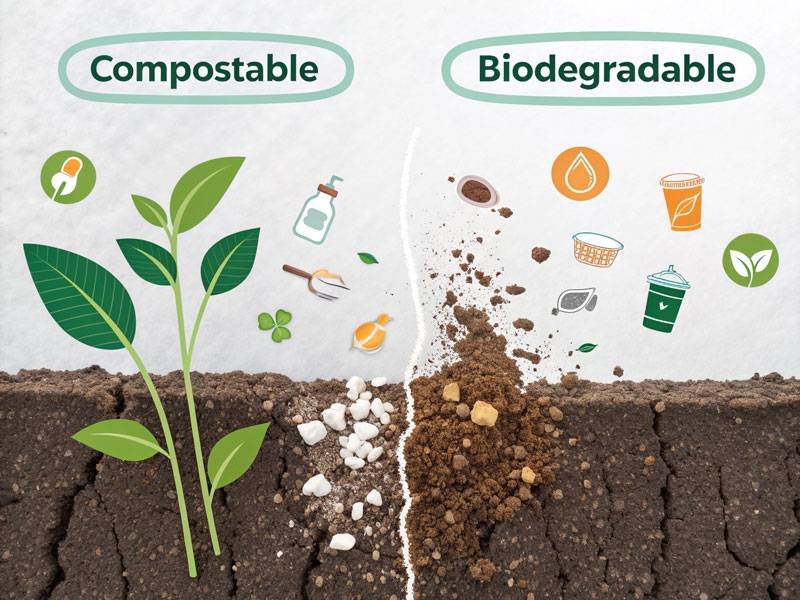
Key distinctions:
- Compostable:
- Requires controlled conditions (industrial/home composting).
- Leaves no harmful residues.
- Certified by standards like BPI or TUV.
- Biodegradable:
- No time or condition guarantees.
- May fragment into microplastics.
- No certification required (less regulated).
For eco-conscious brands, compostable is the gold standard. It ensures a product’s end-of-life is truly sustainable.
Why Certification Matters: Transparency vs. Greenwashing
Without certification, "eco-friendly" claims are meaningless.
Market trust: Certifications (BPI, TUV) prove third-party testing.
Stop greenwashing: Prevents misleading labels like "100% degradable" (but leaves microplastics).
Always look for logos like BPI or OK Compost—they’re your proof.
Core standards for certification: industrial composting vs. home composting conditions
Why do some products carry "industrial composting" labels while others boast "home composting" approval? The difference lies in the breakdown environment.
Industrial composting requires high heat (50-60°C) and managed facilities. Home composting occurs at lower temperatures (20-30°C) in backyard bins. Certifications like OK Compost INDUSTRIAL vs. HOME reflect these conditions.
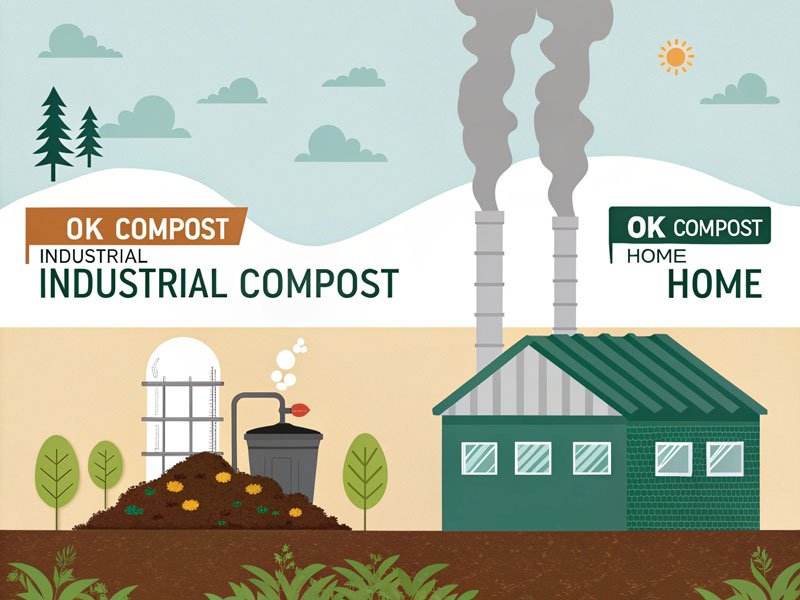
Breakdown of conditions:
| Factor | Industrial Composting | Home Composting |
|---|---|---|
| Temperature | 50-60°C | 20-30°C |
| Timeframe | 180 days max | 365 days max |
| Microbial Activity | High (optimized) | Variable (natural) |
| Common Certifications | BPI, OK Compost INDUSTRIAL | OK Compost HOME |
Choosing between them depends on your product’s use case and market. For example, pet poop bags might need home compostability for consumer convenience.
What is BPI compostable certification?
If you’re selling in North America, you’ve likely heard of BPI. But what does it actually mean?
BPI (Biodegradable Products Institute) certification confirms a product meets ASTM D6400/D6868 standards for industrial composting. It’s the leading seal for compostable products in the U.S. and Canada.
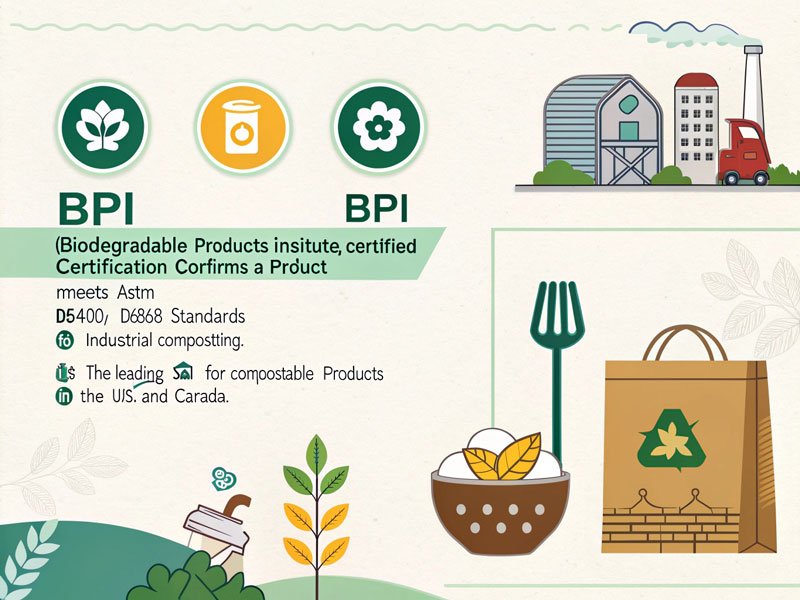
Key details:
- Standard Basis: ASTM D6400 (plastics) or D6868 (fiber-based products).
- Applicable Products: Bags, food packaging, cutlery.
- Testing Requirements:
- 90% breakdown in 180 days.
- No ecotoxicity (heavy metals below limits).
- Process:
- Lab testing by approved facilities.
- Documentation review by BPI.
- Annual audits for recertification.
BPI’s logo is trusted by municipalities and compost facilities. For brands targeting North America, it’s often a must-have.
What is the TUV Certificate?
TUV certification is Europe's leading compostability standard, covering both industrial (EN 13432) and home composting (EN 14995) requirements.
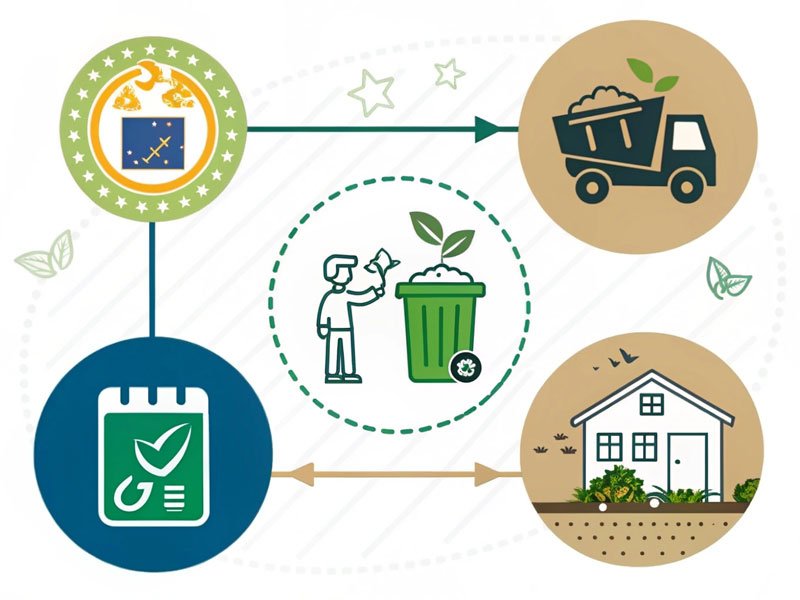
European Standards
- EN 13432 (Industrial Composting)
- EN 14995 (Home Composting)
OK Compost INDUSTRIAL vs. OK Compost HOME
| Type | Decomposition Environment | Certification Period |
|---|---|---|
| OK Compost INDUSTRIAL | Requires commercial facilities | Must degrade in ≤12 weeks |
| OK Compost HOME | Operates in home compost systems | Must degrade in ≤26 weeks |
TUV's Global Influence
As an internationally recognized standard, TUV certification is widely accepted across the EU, Asia, and other markets, particularly for food-contact materials exported to Europe.
What is ASTM D6400 Certification?
ASTM D6400 is a U.S. testing standard (not a certification itself) that forms the technical basis for BPI and other compostability certifications.
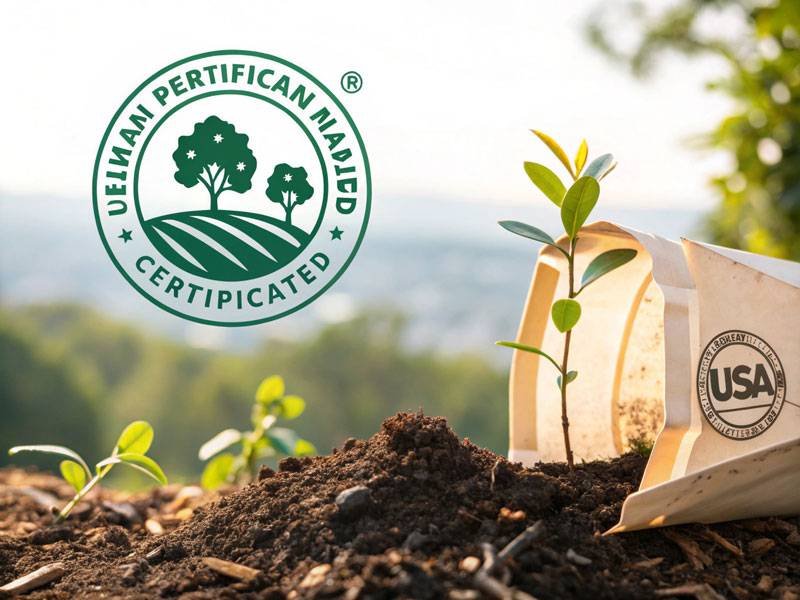
U.S. Testing Standard
- Provides fundamental test methodologies
- Adopted by BPI, DIN, and other certification bodies
Key Requirements
- 90-Day Disintegration ≥90% breakdown into fragments ≤2mm
- Heavy Metal Limits Lead/Cadmium/Mercury ≤50% of EPA thresholds
- Ecotoxicity Testing Compost residues must not inhibit plant germination
BPI, TUV, ASTM D6400 comparison table
| Certification | Region | Standard | Composting Type | Validity |
|---|---|---|---|---|
| BPI | North America | ASTM D6400/D6868 | Industrial | 1 year |
| TUV (OK Compost) | Europe/Global | EN 13432/14995 | Industrial or Home | 3 years |
| ASTM D6400 | Testing standard | N/A | Basis for certifications | N/A |
How to Choose the Right Certification
Target Market (North America vs. Europe vs. Global)
- North America: BPI (ASTM D6400/D6868) is mandatory for municipal composting programs
- Europe: TUV (EN 13432/EN 14995) required for EU market access
- Global: Dual certification (BPI+TUV) recommended for export-focused brands
Product Type and Composting Scenario
| Scenario | Recommended Certifications |
|---|---|
| Industrial | BPI (ASTM D6400), OK Compost INDUSTRIAL |
| Home | OK Compost HOME, ASTM D6868 (limited) |
| Food Contact | Both + FDA CFR 21 compliance |
Cost and Time Considerations
- Testing Fees: $3,000-$15,000 depending on material complexity
- Duration: 8-16 weeks for lab tests + 4-8 weeks certification review
- Renewal: Annual audits (BPI) / 3-year recertification (TUV)
Step-by-Step Certification Process
-
Pre-Testing Consultation
- Identify applicable standards (ASTM/EN)
- Select accredited lab (e.g., DIN CERTCO, BPI-approved facilities)
-
Lab Testing Phase
- Biodegradation (90% in 180 days)
- Disintegration (≤2mm residue screening)
- Ecotoxicity (plant growth test)
-
Documentation Submission
- Technical data sheets
- Material safety declarations
-
Certification Grant
- License agreement signed
- Logo usage guidelines provided
FAQs
-
Can a product claim to be ‘compostable’ after certification?
Only with the certification logo. Unverified claims may violate FTC Green Guides. -
Is home composting certification more difficult to obtain?
Yes, due to variable temperature/moisture conditions in home systems (requires 26-week testing). -
How long is the certification valid?
BPI: 1 year | TUV: 3 years | Renewal requires partial retesting.
Conclusion
Compostable certifications like BPI and TUV prove your product’s eco-claims. They prevent greenwashing, meet regulations, and appeal to conscious consumers. Ready to certify? Partner with a lab or consultant to start testing.
To learn more about certified compostable bags, you can Contact us





